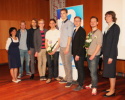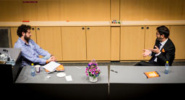News 2013
Stablility of Adaptive Real-Time Systems
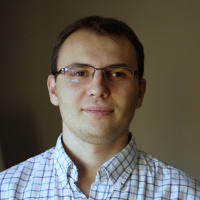
We are surrounded by embedded real-time systems: our phone, car, whashing
machine, and many more. Due to limited resources these systems often include
adaptation mechanisms to trade-off performance for efficiency. Sergiu Rafiliu's
dissertation determines conditions under which these adaptive real-time systems
are stable, meaning that the system’s resource usage is controlled under all
possible run-time scenarios.
The thesis explores whether resource managers used in such embedded systems are
stable, meaning that the system’s resource usage is controlled under all
possible run-time scenarios. Stability implies a bounded worst-case behavior of
the system and can be linked with classic real-time systems’ properties such as
bounded response times for the software applications. In the case of
distributed systems, the stability problem is particularly hard because
software applications distributed over the different resources generate
complex, cyclic dependencies between the resources, that need to be taken into
account.
Read more
Simulations explain your thoughts

Cognition is in many different ways grounded in the sensorimotor systems of
cognitive agents. Henrik Svensson’s dissertation shows how it is possible to
explain higher level cognitive abilities as simulated actions and perceptions,
and also introduces a novel hypothesis of the role of dreams, during early
childhood, in the development of simulations.
The thesis contributes by advancing the theoretical foundations of simulations
and the empirical grounds on which they are based, including a review of the
empirical evidence for the existence of simulated perceptions and actions in
cognition, a clarification of the representational function of simulations in
cognition, as well as identifying implicit, bodily and environmental
anticipation as key mechanisms underlying such simulations. The thesis also
develops the "inception of simulation" hypothesis, which suggests that dreaming
has a function in the development of simulations by forming associations
between experienced, non-experienced but realistic, and even unrealistic
perceptions during early childhood. The thesis further investigates some
aspects of simulations and the "inception of simulation" hypothesis by using
simulated robot models based on echo state networks. These experiments suggest
that it is possible for a simple robot to develop internal simulations by
associating simulated perceptions and actions, and that dream-like experiences
can be beneficial for the development of such simulations.
Read more
Stakeholder Engagement for Service Design

Fabian Segelström's PhD thesis "Stakeholder Engagement for Service Design" is
the first one to be published on service design in Sweden. Service design as a
practice has received much attention the past few years, with governmental
organisations as well as private companies using the approach to help improve
their services based on insights about the service users' needs.
Service design is a field emerging from the new-found interest in services as a
design material by practitioners and academics of the human-centred design
tradition. As such, the field can build on the knowledge from previous work in
design as well as in service research. Introducing a new design material may
however also introduce new challenges to practice. The research presented in
the thesis investigates how the design research phase of the human-centred
design process is affected by making services a design material.
It is argued that service design is a stakeholder-centred design discipline.
The tools used in service design are to a large extent borrowed from other
qualitative research traditions, but design-specific tools do exist. The
information gathered with the tools for stakeholder engagement is then
transformed into insights through analysis and synthesis. These insights are
visualised to provide easily accessible representations of service situations.
Read more
Saab award to Patrick Doherty
The Åke Svensson research stipend this year goes to Patrick Doherty, professor
of Computer Science at Linköping University. Patrick Doherty receives the award
for his outstanding contributions to the development of autonomous unmanned
aircraft systems.
Read more
Best paper award at ACM conference

The paper "Empowering the Creative User: Personalized HTTP-based Adaptive
Streaming of Multi-path Nonlinear Video" was given the "Best Paper Award" in
the ACM SIGCOMM 2013 workshop on Future Human-Centric Multimedia Networking
(FhMN) and will appear in a special issue of ACM Computer Communications
Review. It is based on collaborative work with University of Saskatchewan,
Canada, and NICTA, Australia.
Read more
MIT ranks PhD from IDA one of the most innovative
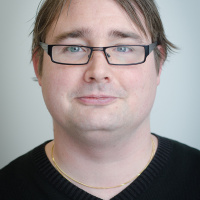
Per Ola Kristensson, cognitive scientist from Linköping that received a PhD at
IDA (Human Centered Systems) 2007 has by MIT Technology Review been listed as
one of the 35 most innovative under 35 year of age in the world.
Read more
Best student paper award

ECSQARU 2013 Best Student Paper Award was awarded to the article "Chain Graph
Interpretations and their Relations" written by Dag Sonntag and Jose M. Peña.
The article covers when chain graphs of different interpretations can represent
the same model and give a theoretical base for what probability distributions
of systems that can be perfectly represented by chain graphs.
The prize was awarded (ex-aequo) and the article is published in the Lecture
Notes in Computer Science, Springer (Volume 7958, 2013).
Read more
Unique M.Sc. in Engineering created at LiU

A completely new master’s of engineering in software technology is currently
being developed at Linköping University. The programme have over 600 applicants
for the 30 positions and will start efter the summer. “There is no education
programme like this in Sweden and we have been able to think in completely new
ways,” says Fredrik Heintz at IDA who has lead the work on the new programme.
Read more
Prize for final year project theses 2012
One Bachelor and one Master level thesis were awarded by Swedish Computer
Society (East) for best IT thesis in 2012. Bernhard Hahn did his thesis at IDA
on analysis of algorithms for smart recipe suggestions on social platforms.
Simon Tegelid and Johan Kihlberg were awarded the prize for map-assisted indoor
positioning.
Read more
Software: security requirements and secure programming
In his PhD thesis, John Wilander studied how security requirements are captured
before public procurement contracts, and treated aspects of code development,
including static analysis, and run-time intrusion prevention.
Ben Livshits from Microsoft Research, a well-known profile within the area of
secure software, acted as opponent at the PhD defence. The seminar was attended
by a large audience from industry including several LiU alumni.
Read more
The Perfect Recommendation does not exist

How do we get service discovery systems to become become more user oriented and
more accurate in selecting the right service for the right user? And more
importantly: How do humans react to such a system if it on paper is perfect?
Magnus Ingmarsson's PhD thesis "Creating & Enabling the Useful Service
Discovery Experience: The Perfect Recommendation Does Not Exist" deals with
these issues.
Read more
Exploiting Structure in CSP-related Problems
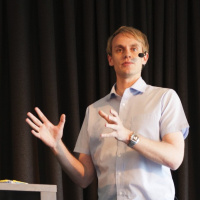
By relating complexity issues in constraint satisfaction problems to properties
of graphs and their structure Tommy Färnqvist has in a recent PhD shown that a
large class of applications e.g. in database search or AI do not have efficient
solutions, thus not polynomially solvable. He has thereafter found a metric to
relate problems that are approximation friendly.
Read more
Improving software security by preventing known vulnerabilities

In his dissertation, David Byers presents a method for process improvement that
is intended to help software developers prevent vulnerabilities, thereby
contributing to a long-term improvement in software security. The approach
builds on the idea that modelling known vulnerabilities and their causes helps
preventing them if the models are accessible in the software development
process.
Read more
Page responsible: Webmaster


